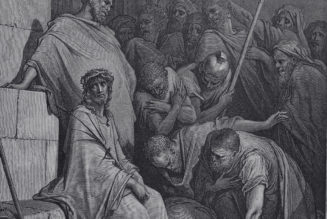By Fr. Jerry Pokorsky ( bio – articles – email ) | Sep 30, 2024
Most pastors are familiar with the unpleasantries of patrolling parish grounds after dark. After disrupting a young couple seeking privacy in the darkness of the parking lot, a young man rolls down the car window. As he zooms away he yells, “I’ll see you in hell!” Many may not believe in God, but they believe in hell. It’s a good start.
The Gospel directs our attention to the reality of hell with the words of Jesus. Jesus refers to the everlasting fires of Gehenna for unrepented sins. Traditionally, we’ve translated that word as “Hell.” The words are interchangeable. Gehenna was a fiery pit of child sacrifice and a metaphor for the everlasting torment of those who offered their children to the Demon Moloch.
Jesus warns: “Woe to you, scribes and Pharisees, hypocrites! for you traverse sea and land to make a single proselyte, and when he becomes a proselyte, you make him twice as much a child of hell as yourselves.” (Mt. 23:15) “You serpents, you brood of vipers, how are you to escape being sentenced to hell? (Mt. 23:33) “But I will warn you whom to fear: fear him who, after he has killed, has power to cast into hell; yes, I tell you, fear him!” (Lk. 12:5)
Hell exists. The threat of condemnation for unrepented mortal sins is real. But we rely on the musings of theologians and poets for metaphors for the punishments of hell that comport with the terrors of the Lord’s warnings. In his Divine Comedy, Dante describes the nine circles of hell in his Inferno. Dante is a tourist accompanied by the Roman poet Virgil. For effect, he even places historical personages in hell.
Dante’s menu for our unrepented sins that deserve condemnation is a provocative examination of conscience: lust, gluttony, greed, wrath, heresy, violence, murder, tyranny, fraud, seduction, flatterers, simony, fortune tellers, astrologers, corrupt politicians, hypocrites, thieves, evil counselors, inventors of religions, perjurers, counterfeits—and most deplorable of all, betrayal.
Many enjoy the Inferno for its classic poetry but refuse to go beyond its literary appeal. As with a scary movie that comes to an end, it is easy to dismiss the Inferno as mere entertainment for literary sophisticates. Jesus’ warnings do not entertain. His admonitions disrupt our spiritual slumber. Some people only place their enemies in their vision of hell and exclude themselves. The Inferno helps dislodge our—my—hidden sins.
Priests hold an exalted office. They proclaim the Gospel, celebrate Mass, forgive sins in the name of Jesus, witness marriages on behalf of the Church, baptize babies and converts, and govern their parishes. Many priests celebrate over 500 public Masses every year. Over the length of their priesthood, they hear tens of thousands of Confessions. They pack an impressive resume for their Day of Judgment. But they can ruin it all by the commission of a single unrepented mortal sin rooted in a secret pattern of vice.
Suppose Peter did not repent of his threefold denial. Suppose James and John continued to pursue a life of glory and comfort instead of taking up their crosses and following Jesus. Suppose Paul resisted God’s grace and continued to persecute Christians. Suppose the Apostles built a religion based on practical politics rather than the Cross and Resurrection of Jesus. The Scriptures describe the terrible ending of Judas.
Dante places Judas in the depths of hell. Betraying the faith and refusing to repent is a detestable sin. With poetic license, Dante also places priests, popes, and cardinals who engaged in wasteful extravagance and accumulation of possessions in the inner circle of greed. Dante even encounters a pope in the circle of heretics.
Jesus describes the torments of hell. “And if your eye causes you to sin, pluck it out; it is better for you to enter the kingdom of God with one eye than with two eyes to be thrown into hell, where their worm does not die, and the fire is not quenched.” (Mk. 9:47-49) Dante’s graphic metaphors help us heed these warnings.
Dante describes the violent winds that smash people guilty of lust into rocks and mountains. A worm monster overlooks the souls of gluttons, and they suffer a never-ending rain of human waste amid a never-ending ice storm. Living organs, solid waste, and putrefied mud fill the landscape. Greedy sinners joust with great weights on their chests. The weights symbolize their never-ending greed for more possessions. As in this life, the souls driven by hatred fight each other furiously. Their hatred continues amid the putrid and decomposing waters of the inferno.
The circle of violence punishes murderers and tyrants in sweltering blood and flames. Drunkards are torn to pieces by dogs. Blasphemers suffer an eternity of burning sand and flaming rain. A frozen lake entombs the treacherous. Lucifer, the glorious angel who rebelled against God, is trapped waist-deep in ice.
The thought of everlasting condemnation following a single unrepented mortal sin is chilling. Even the many good deeds of the priest will torment him in hell by reminding him of his heavenly eternity had he remained faithful.
A sincere Act of Faith is our insurance policy for salvation.
O my God, I firmly believe that you are one God in three divine Persons, Father, Son, and Holy Spirit.
I believe that your divine Son became man and died for our sins and that he will come to judge the living and the dead.
I believe these and all the truths which the Holy Catholic Church teaches because you have revealed them who are eternal truth and wisdom, who can neither deceive nor be deceived.
In this faith, I intend to live and die. Amen.
Jesus is our Savior because He saves us from our sins and the inferno. We believe. We often fail. Please, God, give us—give me—the grace to repent because I believe in eternal glory with God and the communion of the saints. “Acquit me from hidden faults,” O Lord. (Ps. 19:12)
With God’s grace, I’ll see you in heaven.
Sound Off! CatholicCulture.org supporters weigh in.
All comments are moderated. To lighten our editing burden, only current donors are allowed to Sound Off. If you are a current donor, log in to see the comment form; otherwise please support our work, and Sound Off!









